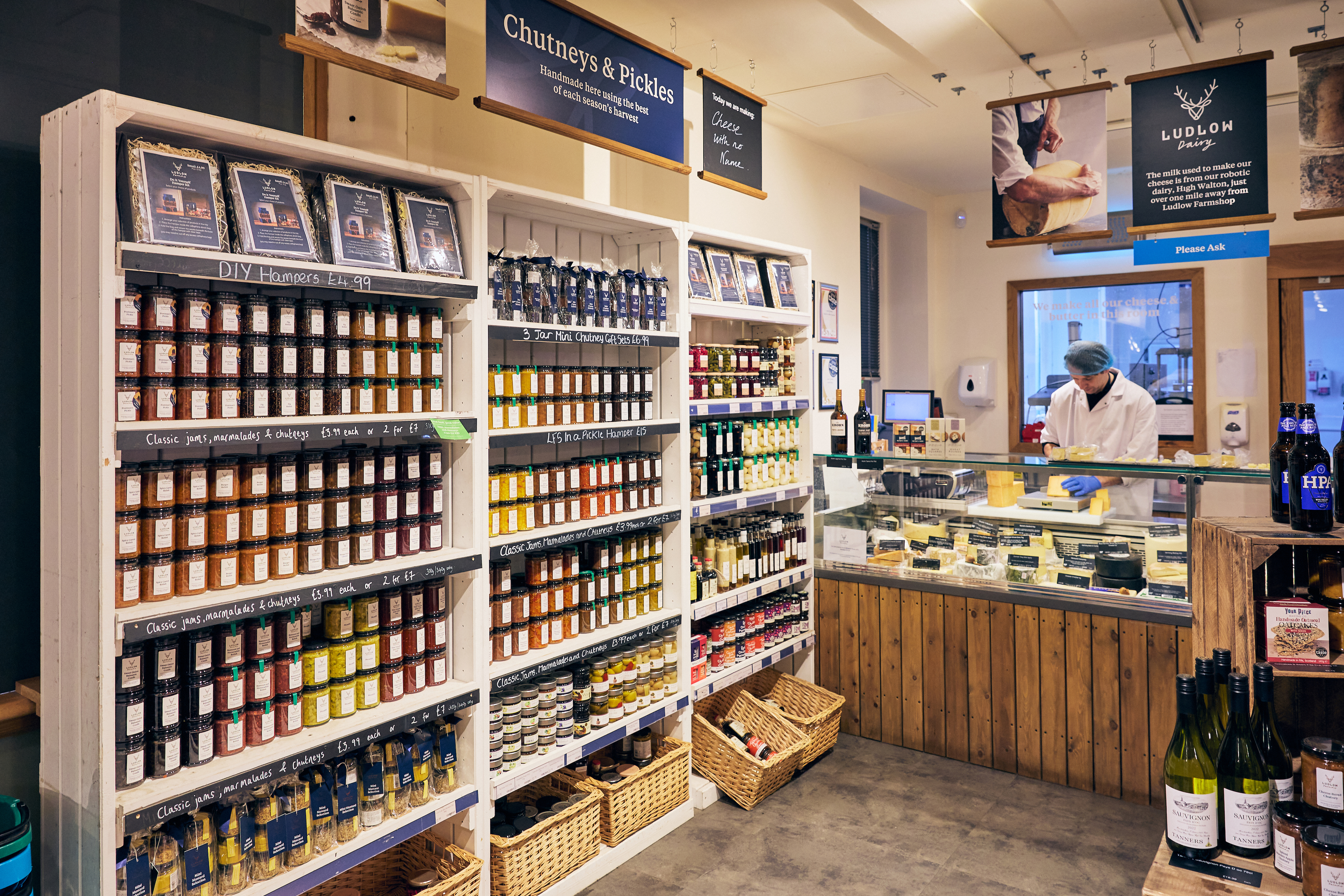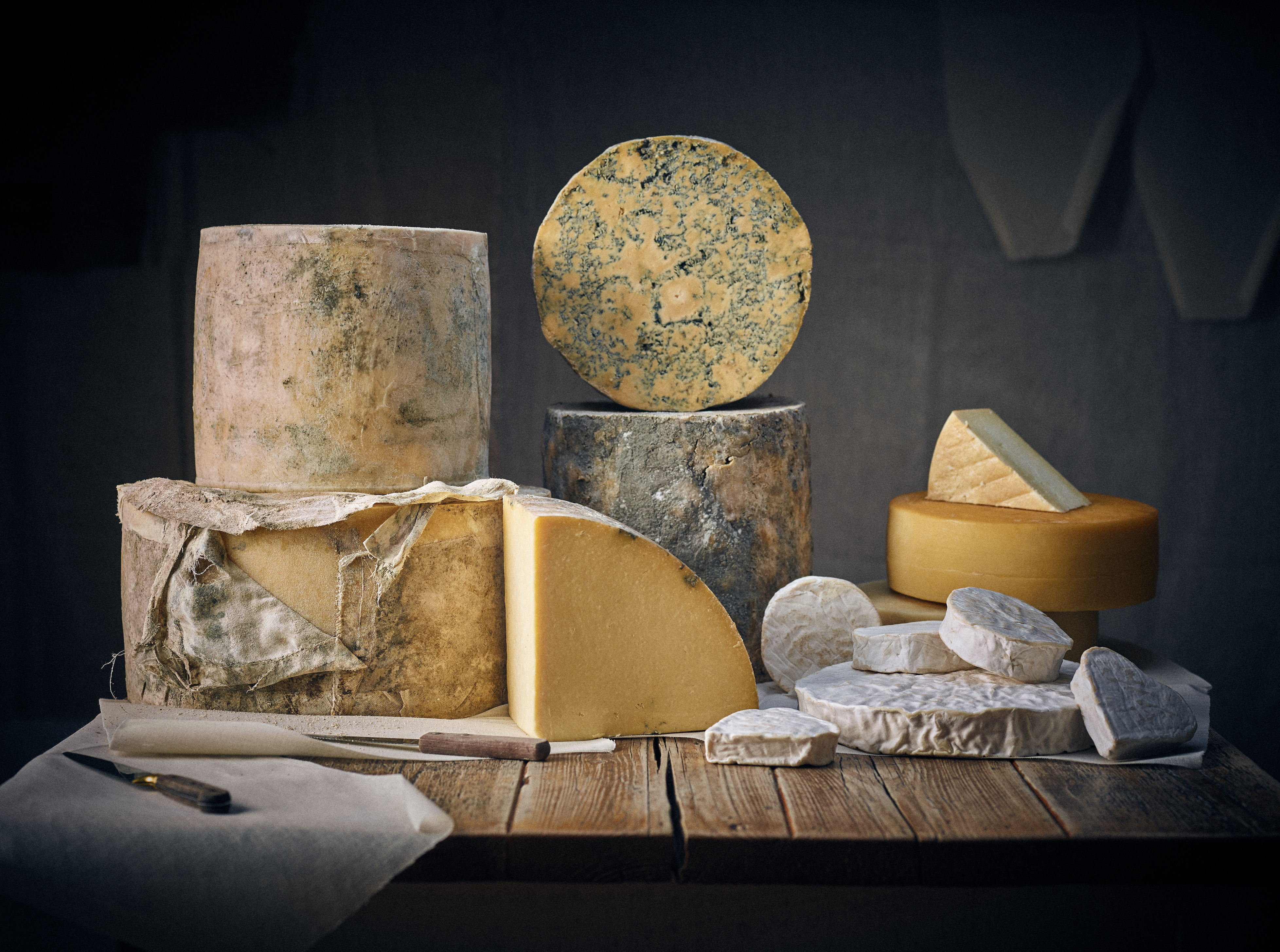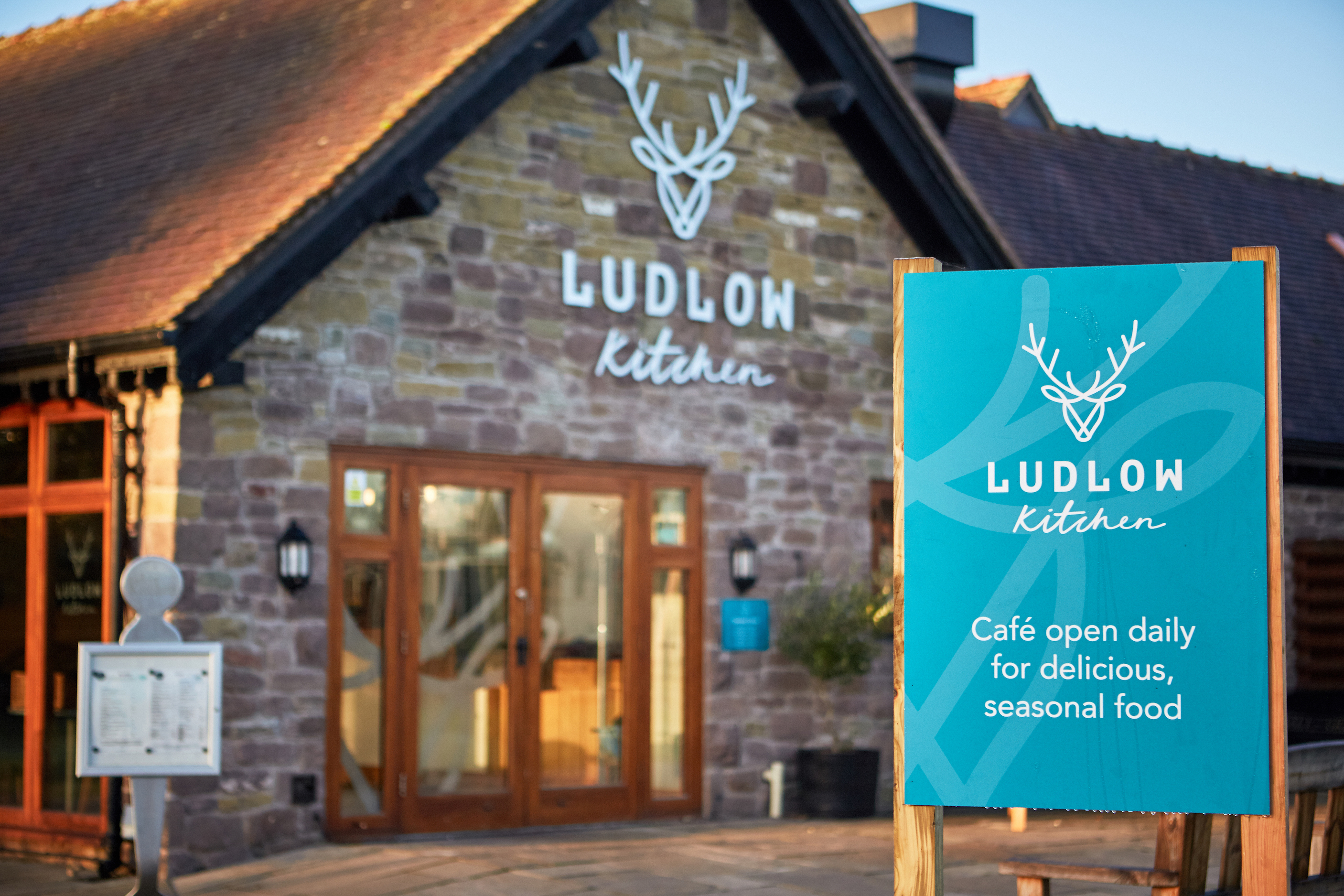Free digital copy
Get Speciality Food magazine delivered to your inbox FREE
Get your free copy
“Passion for food drives everything for us,” says Jon Edwards, managing director of Ludlow Farmshop, a Shropshire-based foodie haven located two miles from the gastronomic town of Ludlow.
Since opening its doors in 2007 on the Earl of Plymouth’s Oakly Park Estate, the farm shop has become a unique site, blending farming, food production and retailing under one umbrella, which has created a special environment based around celebrating local produce and artisan food production.
The Oakly Park Estate encompasses approximately 8,000 acres of Shropshire countryside, of which the team at Ludlow farms 6,500 acres. “Farming is at the very heart of what we do,” Jon explains. The farm shop, he adds, produces many of its own award-winning products from “the bountiful supply of wonderful produce both from the farm and surrounding area”.
In fact, 80% of the food sold at Ludlow Farmshop comes from Shropshire and the surrounding counties – that includes everything from wine produced in rural Herefordshire to flour milled in the Cotswolds to award-winning marmalade made in small batches on site.
Farm shops up and down the UK are known for banging the drum for local producers, but Ludlow goes above and beyond by bringing skilled makers in-house. In fact, over half of the products sold are created in production units surrounding the shop floor. “Bakery, dairy, butchery, production kitchen, jams and pickles and coffee roasting – these units produce high-quality products from scratch,” Jon says.
And producers aren’t hidden away – they’re put centre stage. “These are visible through windows so you can see artisan producers making your food by hand using the produce grown or reared on our own farms. Our original ethos included this concept, and it’s still as strong today,” he continues.
In addition to seasonal fruit and vegetables, which are grown less than half a mile away in the farm’s walled garden and sold in the farm shop, the entire team strives to utilise all that is good from its farms alongside traditional production methods to produce great tasting food, Jon says. “We support local suppliers by providing them the opportunity to retail at a fair price. Supporting the local economy is key for us, particularly as we seek to attract visitors to the area.”
Offering seasonal, fresh, local, and handmade produce is at the core of the business at the shop – and that has led the team to continuously diversify and innovate. “We believe in the pleasure of better tasting, real food, through continuous development and keeping skills and flavours alive; truly making the most of our region,” Jon says. “Our values give a sense of our land and farms, people, and passion for sustainability.”
At the heart of the farm shop is the butchery department. All the meat products sold, including at the on-site hotel and café, use the meat prepared by head butcher John Brereton and his team.
John manages a full-carcass operation in the butchery. “To ensure the best results are achieved from each carcass, John uses many different ways to add value and manage his carcass in balance by doing his own curing, smoking, production of charcuterie and selling a range of unusual cuts,” Jon explains.
And as well as working closely with the herdsmen across the farm to ensure only the best animals are sent to the farm shop, allowing for full quality control of the shop’s meat, the butchery also boasts ultra-low food miles.
The farm’s cattle and lambs are transported to Griffiths of Leintwardine, an abattoir that’s a mere seven miles away, before the meat is prepared for customers on site, “which means less stressed animals and a lower carbon footprint,” Jon says. The meat is then traditionally matured and prepared.
The bakery team, meanwhile, craft fresh biscuits and cakes from scratch using local ingredients seven days a week. More than 20 varieties are made on site, with new recipes and ideas constantly in the works. “We bake many traditional products like Victoria Sponge and shortbread, as well as championing local specialties, like Shrewsbury biscuits,” Jon says. These melt-in-the-mouth biscuits are infused with mixed spice, lemon zest and currants for a buttery treat.
The shop takes deliveries of fresh bread (from classic white loaves and French sticks to the delicious focaccias and sourdoughs) six days a week from Bread2Bake, a nearby bakery. “We also offer a unique Bromfield Black, which is exclusive to Ludlow Farmshop,” Jon says.
Who doesn’t love the smell of fresh coffee? At Ludlow’s in-house coffee roasting room, the team work their magic on ethically produced and sourced green coffee beans, which are blended, roasted and ground in small batches – a process that is all overseen by specialist Hannah Bond. “This coffee is then packaged ready for the shop floor, prepared for use at The Clive Arms hotel,” the boutique inn also on the Oakly Park Estate, “or sent over to be freshly ground by baristas at our café,” Jon says.
By trading directly with small-scale farmers to hand-roasting each type of bean in small batches and finally producing a number of blends that are unique to the site, Ludlow Farmshop showcases a truly artisan product.

In another corner of the farm shop, a jams and pickles department is run by Teresa Holdsworth, and together with her team she produces approximately 100,000 jars of Ludlow’s own-recipe jams, preserves, marmalades, chutneys, oils, sauces and pickles every year.
These products, like everything else in the shop, have a natural and local focus. They “use fruit and vegetables sourced as locally as possible and are always made in small batches,” Jon says. “No artificial pectin is used as they are set when the ingredients are in season – if needed fresh lemon juice is used instead. We don’t use thickeners and instead reduce the consistency which produces a more concentrated and intense flavour.”
Deli products are a must-have in any farm shop as expansive as Ludlow, and the in-house kitchen does not disappoint. They create from scratch a huge range of products using cuts of meat from the butchery, cheese from the dairy and chutneys created by Teresa and her team, alongside other locally sourced products.
“From Scotch eggs to quiches to award-winning pies, the kitchen department is a hive of activity,” Jon says. One of the kitchen’s signature dishes is the Shropshire Fidget Pie, made with gammon, cooking apples, onions and potatoes.
Ludlow’s dairy is not to be missed on a tour of the site’s production hubs. It produces the milk that’s used across the farm shop, including in the making of artisanal cheeses (hard, semi-hard, soft, blue and smoked varieties), butter, yoghurt and more in small batches.
Just two miles away from the farm shop, there are more than 300 dairy cows located at Ludlow’s robotic dairy. “Only 10% of dairy farms in the UK use this robotic system, which contributes to high animal welfare as a major benefit,” Jon explains.
Technology has been incorporated to push their traditional methods to the cutting edge. “Not only do we milk through the full robots, we also graze through technology which is quite unique for robotic units. For the majority of robotic units, the cows stay in all the year round, but we prefer cows to be grazed on welfare grounds, so we summer graze our cows – you can actually see the cows grazing from here if you know where to look!” he says.
Indeed, welfare is a priority at Ludlow. What is most extraordinary about the dairy unit, Jon says, is how relaxed the cows are, “and the best bit has to be the satisfaction of seeing how happy they are,” he continues. “They have nice, soft beds which are sprung, a robotic feeder, and they even have back scratchers! They are so laid back and do everything when they want to. They are not driven or herded anywhere, so there is no stress; it really is quite something.”

For the diary’s cheesemaking operation, each morning, dairy manager Paul Bedford collects the milk produced by the dairy cows. Then, Jon says, “the first step in the process is to pasteurise the milk to make it safe for consumption. It then goes through different processes depending on what type of cheese is made,” for example hard or soft. The dairy’s soft cheese, Cheese With No Name, only takes two weeks to mature, so the curd is taken out and put into a cheesecloth to drain. This cheese, described as “wickedly rich,” is the farm shop’s best seller.
The hard cheeses, meanwhile, are put into a press and then into storage. The Oakly Park Cheddar is aged between five to six months for a medium-strength flavour in a temperature-controlled maturation room on beechwood shelves.
Ludlow Farmshop’s cheeses have claimed numerous awards, and in 2016, one was even recognised on an international scale, picking up bronze at the World Cheese Awards. It’s “something we are hugely proud of against such tough competition,” Jon says.
Jon praises the work of dairy manager Paul, who has been with the team for over 14 years. He “is instrumental in making such great-tasting, award-winning cheese. Our newest cheese, Ludlow Red, which is a raw milk cheese, was developed from Paul’s ideas, skill and experience, and this went on to win at the Great Taste Awards shortly after it launched.”
Diversification has not been without its difficulties, however. With business booming at the farm shop, the team decided to open Ludlow Kitchen, an on-site café, to allow customers to sample some of the shop’s fantastic products before buying them. But Covid hit the café hard.
“This, coupled with the huge raw ingredient cost price increases, have meant for some challenging times,” Jon admits. Despite this, the team is firmly committed to providing customers with high-quality products using locally sourced ingredients. The café has “gone from strength to strength over the years” and is, Jon claims, “without doubt one of the busiest cafés in the local area.”

These challenges have also created opportunities, and the team at Ludlow do not rest on their laurels. “We are always looking for ways to improve and enhance a customer’s experience when they dine, so we are looking into changing the way we operate to ensure we are running in the most efficient way possible, and in turn, improve the customer’s visit.”
Another result of Covid was increased demand for outdoor seating areas and takeaway options. “In July 2022, we opened our onsite takeaway, Ludlow Pantry, which has proved extremely popular with our visitors,” Jon says. “Opening early every day, Ludlow Pantry is the perfect place to be able to grab a hot drink or food on the go in the morning, or it is ideal for a lunchtime treat. The products sold in the takeaway are still made at Ludlow Farmshop, so we continue to offer the highest quality food in all areas of the business.”
The Pantry also emphasises Ludlow’s local focus, as 2p from every cup of coffee sold is donated to a local charity. “Supporting local organisations is something close to our hearts,” Jon says.
The site contributes to the local hospitality industry too, through its inn, The Clive Arms, which was refurbished in 2019 to offer a place to relax and explore the Shropshire countryside. “Ludlow town is renowned for its food excellence, and at The Clive Arms we like to think we are helping to uphold this reputation. Our chefs use fresh, local and seasonal ingredients to create food that is traditional with a modern twist.”
Nothing delights the team at Ludlow Farmshop more than when a customer loves their food and what they do. In fact, the products they make have become so beloved by customers that their reach is expanding to other nearby farm shops, speaking to their true quality. “We have recently begun selling our products to other farm shops, delis and restaurants across the UK, so people can enjoy our products wherever they are as much as we do,” Jon says.
Since 2023, the farm shop has sold its jams, marmalades, chutneys and pickles to businesses across the UK. “The response to this has been great. We launched the range at the Farm Shop & Deli Show last year, and the feedback we received about the brand, the quality, the product and the service we offer was outstanding,” Jon says. “We are only at the start of this journey, but we are very excited about its future and keeping the Ludlow ‘foodie’ reputation going across the country.”
Whilst Ludlow Farmshop remains the “anchor” of the site, Jon says that all the other areas “are performing so well on their own, which is a delight to see”. Naturally, the creative team is grabbing every new opportunity as it comes and are continuing to expand as a foodie destination.
“On-site, you will also find Ludlow Distillery, The Artists’ Gallery, a picnic area and children’s play area – there really is something for everyone,” Jon says.
The distillery is a particularly unique offering for a farm shop, as they tend to stay in the realm of delis, dairies and cafés.
“The idea that Ludlow Distillery might find a home at Ludlow Farmshop came about at their launch in 2018,” Jon explains. “Viscount Windsor happened to be at their stand and quietly said, ‘You’d be a good fit for the farm shop’. It took a few years to get here, but we are so glad to be celebrating their first birthday on-site in 2024.”
The distillery’s ambition was to create not just a drink, but an experience. In addition to its flagship shop, Ludlow Distillery offers daily distillery tours where customers can take a closer look at how the brand handcrafts its premium spirits – or can even create their very own botanical gin at the Gin School.
“Our year has been incredible,” founder Shaun Ward says about their time on-site at Ludlow Farmshop. “Nearly 1,500 people on tours and five-star rating in trip advisor – we’re pretty chuffed.’
Jon adds that he is “so delighted to have Ludlow Distillery on-site”. Like the ambitious expansions and additions that came before it, it adds yet another feather in the cap of this artisan foodie empire. “It really offers our visitors something different and makes us a true destination to visit in south Shropshire.”